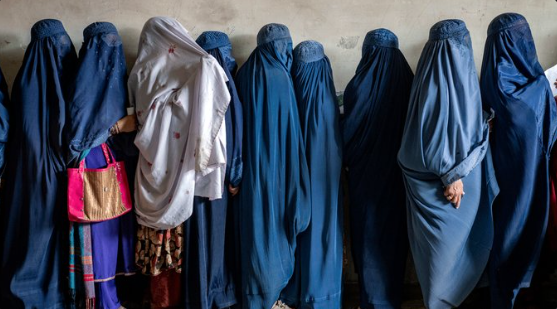Muslims have little regard for the rights of women in Afghanistan. They ae considered second class citizens, so the actions of terrorists like the Taliban that Biden helped dominate Afghanistan, should not shock anyone.
On Sunday, Afghan women were barred from participating in high-level meetings in Qatar between the Taliban and United Nations leaders, as well as special envoys focused on Afghanistan. The Taliban had stipulated the exclusion of women from their country as a precondition for their attendance.
TALIBAN ATTEND UN MEETING IN QATAR, WOMEN EXCLUDED
A Taliban delegation attended a UN-led meeting on Afghanistan in Qatar, focusing on the Afghan crisis.
Zabihullah Mujahid, Taliban spokesman, mentioned meetings with representatives from Russia, India, and Uzbekistan. Women… pic.twitter.com/ypck3gvz7Y
— Live Updates (@LiveupdatesUS) June 30, 2024
Jason Howk, director of Global Friends of Afghanistan, expressed strong criticism, stating, “The diplomatic community’s constant caving to terrorist demands only reinforces the Taliban view. Women and girls in Afghanistan are living in an open-air prison and are treated as less than human. Abduction, rape, torture, and murder are daily realities for women under the Taliban’s gender apartheid system.”
The meetings reportedly discussed private sector growth, banking restrictions, and drug trafficking. Taliban chief spokesperson Zabihullah Mujahid led Afghanistan’s de facto authorities. Following these discussions, special envoys were scheduled to meet with Afghan women and civil society members.
Howk condemned the exclusion of women from the Doha talks, arguing that diplomats or nations supporting such measures should be publicly shamed. He emphasized that Afghan women, who advocate for human rights, must be included in every discussion about the country’s future and that the Taliban should be excluded until they change their stance on human rights and terrorism.
U.N. spokesman Jose Luis Diaz assured that human rights, especially those of women and girls, would be raised in all discussions with the Taliban. However, Diaz did not specify whether the discussions would address the extensive list of repressive Taliban orders, such as forced veiling, the ban on education for girls beyond the sixth grade, and restrictions on women’s travel without a male chaperone.
U.S. participants included Special Representative for Afghanistan Tom West and Special Envoy for Afghan Women, Girls, and Human Rights Rina Amiri. According to a State Department spokesperson, West and Amiri participated only after ensuring the agenda’s substance and confirming meaningful engagement with Afghan women and civil society members.
The Taliban firmly stated they would not discuss women’s issues in Doha. Mujahid reiterated during a press conference in Kabul that their meetings, including those in Doha, would not address the lives of Afghan women, insisting these matters are internal and should be resolved within the framework of Islamic Sharia.
No Afghan women allowed to attend UN-led meetings with Taliban: ‘Caving to terrorist demands’: Afghan women were blocked from attending the high-level meetings between the Taliban and United Nations leaders and special envoys dealing with Afghanistan in… https://t.co/N7fUWbhbq6 pic.twitter.com/df00MzqIXY
— NahBabyNah 🗳️Trump🗳️ (@NahBabyNah) July 1, 2024
In an interview, Roza Otunbayeva, Special Representative of the Secretary-General for Afghanistan and Head of the UN Assistance Mission in Afghanistan (UNAMA), indicated that women’s issues might be raised indirectly through discussions on private industry, banking, and counternarcotics policy.
Since the implementation of Sharia law across Afghanistan by Taliban supreme leader Haibatullah Akhundzada in November 2022, Afghan women have faced severe physical attacks for alleged lawbreaking. Public floggings and other brutal punishments have become common. The 2023 Human Rights Report by the State Department detailed allegations of women being raped in Taliban prisons, forced abortions, and executions following severe sexual assaults by Taliban members.
Suhail Shaheen, head of the Taliban’s Doha political office, dismissed Western media reports about women’s issues as inaccurate, claiming girls have access to education in specific institutions. However, he did not provide details on the number of girls receiving education or how they could qualify for higher education given the ban on schooling beyond the sixth grade.
Journalist Lynne O’Donnell, who has investigated allegations of Taliban members raping imprisoned Afghan women, criticized the dismissal of her reports as Western propaganda. She contended that international entities, including the U.N., the U.S., and the EU, are colluding with the Taliban.
Bill Roggio, a senior fellow at the Foundation for Defense of Democracies, warned that U.N. personnel in Doha should not underestimate the Taliban, noting their organizational prowess and sophisticated negotiation strategies that led to the U.S.’s ouster from Afghanistan.
Otunbayeva acknowledged the challenges in transforming the Taliban from combatants to participants in civil governance. Despite some claims of support for girls’ education within the Taliban, Roggio argued that the Taliban remains united in their oppressive stance towards women.
“The Taliban are reportedly demanding that no Afghan women be allowed to participate in the UN meeting in Doha starting 30 June, set up to discuss the international community’s approach to Afghanistan, and that women’s rights are not on the agenda.
Since taking power in… pic.twitter.com/zl2kNvL3xf
— Genevieve Gluck (@WomenReadWomen) June 23, 2024
The Taliban had not been invited to the initial Doha summit in May 2023 and refused to attend a subsequent conference in February after rejecting U.N. conditions that would have allowed broader representation of Afghan society.
Stéphane Dujarric, spokesperson for the U.N. Secretary-General, reiterated last week that meetings between U.N. officials and Taliban envoys should not be seen as official recognition or legitimization of the Taliban as the government.
Major Points:
- Exclusion of Women: Afghan women were barred from high-level meetings in Qatar between the Taliban and United Nations leaders, with the Taliban demanding their exclusion as a precondition for attendance.
- Criticism from Advocates: Jason Howk and other critics condemned the diplomatic community for yielding to Taliban demands, emphasizing the severe human rights abuses women face under Taliban rule.
- Focus of Meetings: Discussions reportedly covered private sector growth, banking restrictions, and drug trafficking, led by Taliban chief spokesperson Zabihullah Mujahid.
- Commitment to Human Rights: U.N. and U.S. officials assured that women’s rights would be a central topic, although specifics on addressing repressive Taliban orders were not confirmed.
- Dismissal of Western Reports: Taliban representatives, including Suhail Shaheen, dismissed allegations of abuses against women as inaccurate, while journalist Lynne O’Donnell and others highlighted ongoing severe rights violations and international collusion with the Taliban.
Kirk Volo – Reprinted with permission of Whatfinger News


